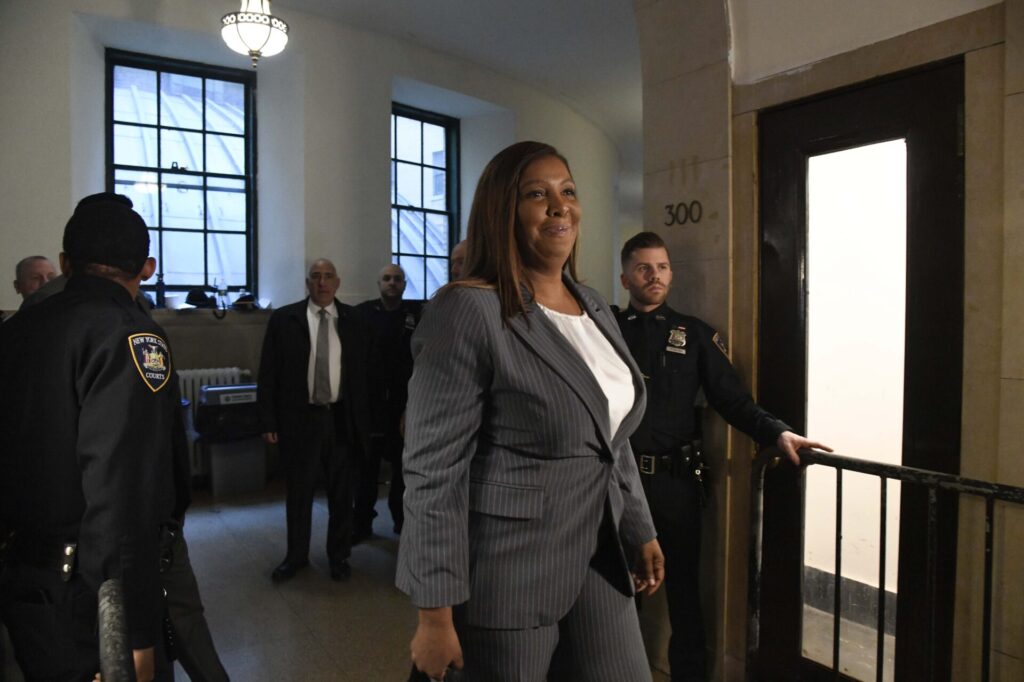A panel of five judges at the Appellate Division, First Department, in New York heard oral arguments surrounding former President Donald Trump’s appeal of a $454 million civil fraud judgment [1], raising doubts [2] about key aspects of the case brought by New York State Attorney General Letitia James.

The hearing, which took place Thursday, delved into the use of a consumer fraud statute, the scale of financial penalties, and the private nature of the transactions involved in Trump’s real estate dealings.
The legal challenge stems from a February ruling by Justice Arthur Engoron, who ordered Trump to pay over $454 million in penalties and interest for allegedly inflating his net worth to secure favorable terms from lenders and insurers.
Trump’s legal team contends that the lawsuit was filed too late and that the hefty financial penalty is unjust, as there were no clear victims and no financial losses incurred.
During the hearing, two judges appeared particularly skeptical of the state’s case.
Justice Peter Moulton raised concerns about the size of the penalty, asking, “How do you tether the amount that was assessed to the harm caused here where the parties left these transactions happy?”
This echoed the defense’s argument that Trump’s lenders and business partners did not suffer any financial harm.
D. John Sauer, Trump’s attorney, argued that there were no victims or complaints in the case, emphasizing that discrepancies in Trump’s stated net worth did not affect the deals in question. “What is not disputed is the testimony that if the net worth had been as low as one million dollars, the deal would’ve been exactly the same,” Sauer stated.
The appeal also questioned the authority of Attorney General James in pursuing the case, with Judge David Friedman asking whether there was any precedent for using consumer protection laws to sue over private transactions between sophisticated parties.
Friedman noted that previous cases cited by the state involved consumer or marketplace damage, which was absent in Trump’s case.
In the original trial, Engoron ruled that Trump and his organization had committed fraud by overvaluing assets and exaggerating Trump’s net worth on paperwork used for making deals and securing financing.
Trump was initially hit with a penalty of $355 million, which has increased to approximately $470 million due to accruing interest.

Sauer reiterated that the lawsuit violates the statute of limitations and warned that upholding such a verdict could have far-reaching consequences for the real estate industry. “If the verdict is not overturned, people can’t do business in real estate without fear,” he said.
Despite the defense’s arguments, state prosecutors maintained that there was sufficient evidence to support the verdict, with Deputy New York Solicitor General Judith Vale arguing, “Although this is a large number, it’s a large number for a couple of reasons. One, because there was a lot of fraud and illegality.”
The Appellate Division typically issues rulings about a month after arguments are completed, meaning a decision could come before the 2024 presidential election, in which Trump is the presumptive GOP nominee.
Trump has vowed to fight the case all the way to the U.S. Supreme Court if necessary.
His legal team has also sought to reduce the $454 million civil fraud judgment, calling it “draconian, unlawful, and unconstitutional.”
Throughout the trial, Trump’s attorneys argued that his financial statements contained disclaimers advising banks to conduct their own assessments.
Witnesses, including former Deutsche Bank executives, testified that the banks saw Trump as a valuable client and actively sought additional business from him.
The appeal continues as Trump’s legal team fights the substantial penalty, with the outcome potentially influencing Trump’s financial standing and political campaign.